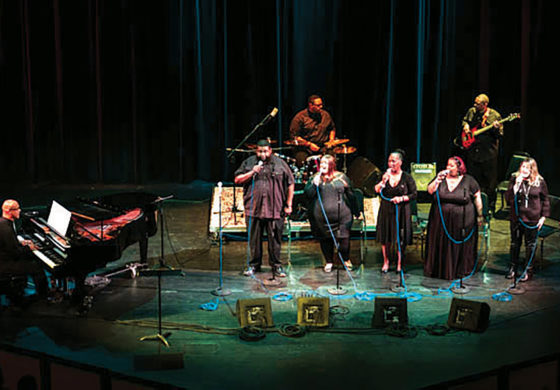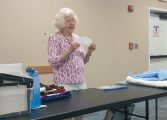By Page H. Gifford
Correspondent
Horace Scruggs and his musical group, Odyssey of Soul, performed at Carysbrook Performing Arts Center to an enthusiastic crowd Feb. 17. They delivered the third lecture-concert in Scruggs’ Odyssey of Soulseries, which was entitled A View from a Train: Decoding the Stories and Music of the Underground Railroad. It was a fitting performance for Black History Month.
Not only was the music inspirational and energizing, but the message was interesting and enlightening. As with the past concerts in Scruggs’ series, the music illustrated the struggles of African Americans from slavery through the Civil Rights era. He explained unjust laws and quoted the Rev. Dr. Martin Luther King, Jr.: “A just law is a manmade code that squares with the moral law or the law of God.”
It shed a new light on the relationship between the slaves and those that owned them. Scruggs explained that since slaves couldn’t read they were taught the stories in the Bible, and as a collective group of enslaved people they were equated with enslaved Jews in the Bible.
Slaves turned their biblical experiences into real faith and lived in the hope of one day being free, and their music reflected that. The music also had an underlying meaning, and much came to be known as “signal songs” and “map songs” during the mass resistance known as the Underground Railroad.
“We learned to sing first but in Africa they learn rhythm first with drums. This was a form of communication. Drums were taken away from slaves because when they played drums, bad things happened,” said Scruggs. “So songs were used to communicate escape.”
He talked about Harriet Tubman, one of the leaders of the Underground Railroad, who lived a horrific life as a slave in Maryland but escaped to freedom. She began to build a network of abolitionist sympathizers who helped her free her people. The group then followed with a stirring rendition of Go Down Moses. This song was attributed to Tubman because of the work she did on the Underground Railroad.
“For those slaves who could get into Pennsylvania, it was an easier road to freedom,” Scruggs said. “The term ‘being sold down the river’ was if you were a slave in a state like Maryland or Virginia and tried to escape, you would be ‘sold down the river’ into the deeper South in Mississippi or Alabama.”
Also notable was abolitionist William Still, who was a conductor on the Underground Railroad and kept records of all who passed through. Often called “the father of the Underground Railroad,” Still helped as many as 800 slaves escape to freedom.
“He interviewed each person and kept careful records,” Scruggs said. “He kept his records carefully hidden but knew the accounts would be critical in aiding the future reunion of family members who became separated under slavery – which he had learned when he aided his own brother Peter, whom he had never met before.”
As the music punctuated the history lecture, it brought elements of the past alive and the struggles were vivid. The gospel songs are haunting yet optimistic that there is a better place waiting.
The concert ended with the signature civil rights song, We Shall Overcome, which describes a yearning to walk hand in hand, live in peace, and embrace freedom without fear.





